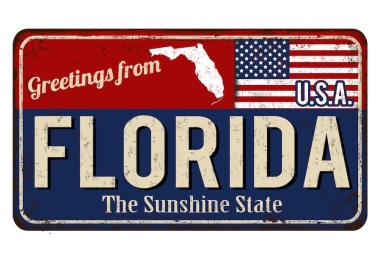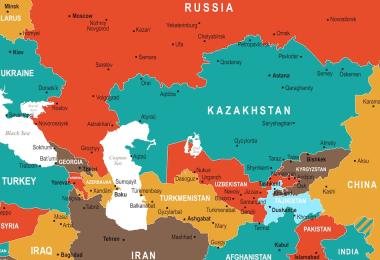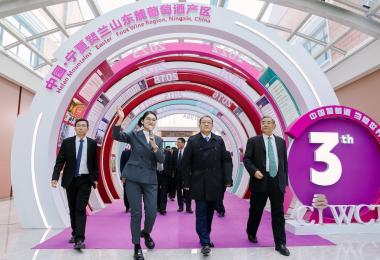Andrea Sartori is president of Italian producer Sartori di Verona, founded in 1898 and now one of the most significant wine companies in Veneto. He studied at Verona’s University of Economics and Commerce, attended business school in Vicenza and went on to Columbia University in New York. He then returned to Italy to put his energies into revitalising and modernising the company, including expanding its export reach. He became president in 2000. He has played an active role in a number of wine organisations, including being president of the Confederazione della Vite e del Vino, from 2004 to 2010. He was vice president of Federvini from 2005 to 2008, sat on the board of the marketing group Consorzio Italia del Vino, was a board member of CEEV (the European Committee of Wine Enterprises) that lobbies Brussels, and is on the board of Crever, the Veronese bank. He is currently the president of the Consorzio Tutela Vini Valpolicella. He has worked tirelessly to build not just his family business, but the entire Italian wine sector.
MEININGER’S: What did you learn at Columbia University that really surprised you?
SARTORI: The American system is based on large corporations and multinationals, which is not applicable a lot to this country because, as you know well, the average size of company in Italy is very small. Most of us are family businesses. It was a total cultural shock for me, being used to small and medium-sized company in this country.
MEININGER’S: Do you think that the corporate mentality has anything to teach small and medium-sized businesses? Or vice versa?
SARTORI: I think the way we do business in this country has a lot more humanity. And I think sometimes the big guys are totally lacking this. We have seen, far too many times, cutting people and firing people in order to save profit, which is not the Italian case. The Italian case is you save people rather than profit. And this is, I think, the biggest cultural difference. On the other side, what we could learn from those guys is their organizational model, which is, most of the time, impeccable. The Italian organization model is Italian, so everybody has his own opinion, and everybody is not going along with the orders. That was also the other shock. When corporations give orders to people, or let’s say strategy or directions, they’re all for it.
MEININGER’S: When you got back to Italy, you became the managing director of Sartori di Verona, and then you were made president in 2000. The company has tripled in size since then. What key decisions did you make that helped to launch that incredible growth?
SARTORI: When I came back, I was doing the Italian market more than anything else. And then, after a few years, I asked my dad and my uncle, “I think I would like to also start to look into the export markets” which were already quite big for us, but I thought we needed to develop more. I started little by little to go into export. Finally, I ended up managing the whole export market. And then I became president and I started to work on a lot of change.
MEININGER’S: Can you explain what you did? It was quite dramatic.
SARTORI: In 2000, we sold 40% of Sartori to a co-op called Cantina di Colognola, and they became part of us. I wanted to have control from grapes to bottle. And the only way to have that was to bring somebody into the company that had control of grapes. But the added value was that our board now included people that were not part of the family – it helped us enormously to think as a company rather than a family.
MEININGER’S: What other changes did you make?
SARTORI: What I started to do is to change the mentality of the people here. We changed some people too. We were very healthy in terms of general managing, but we were getting a little bit tired. We were not innovative. And I didn’t like that. Our packaging was old, boring. The bulk of the business for us back then was UK and then US, and a little bit of the Canadian market. We needed desperately to open more markets. We needed to become more exciting to change things, to modernize, to modernize the style of the wine, to modernize the style of our packaging, but also to modernize the people, to modernize our way of thinking, to modernize our way of making wine. I started little by little to hire different people and to work on the directions to implement different management models into the company. It paid off though, because we were close to €13m turnover, €14m turnover. And we ended up last year with €52m turnover. We are now in 70-plus countries.
MEININGER’S: What other decisions really made a difference to the business?
SARTORI: I think the main difference is exactly what I say, the fact that we became a company versus a family. And that was a turning point. And I think that stimulated everything else we have done.
And we can’t deny Veneto today is the home of some of the most successful varietals in the export markets. We can’t deny that the main wines in our portfolio became very successful in the last 20 years. If I look to the numbers of Valpolicella and Amarone and Ripasso, and so forth, you see a total acceleration of sales in the last 15, 20 years. Pinot Grigio is part of our production, and of course, Amarone, Ripasso, and Valpolicella. So, it’s all there. If you look to the export numbers of Veneto, we are by far the biggest region in Italy right now. We were exactly in the right position to take advantage of that growth, and then also lucky because we are where we are.
MEININGER’S: Amarone has been one of the great Italian success stories, but it has dipped a little bit recently. Can you talk about what’s happening with Amarone and what can be done to get a higher value per bottle?
SARTORI: Amarone lately struggles a bit, although last year’s numbers are showing growth again. We lost a little bit of volume between ‘18 and ‘17. But if you compare ‘19 and ‘18, we went back to the positive. So, it’s coming back a little bit, but we can’t deny that, lately, we have seen some awful pricing of Amarone on the shelf. This to me is due to some oversupply, especially in the last year, and it’s due to, unfortunately, the mentality of some of the operators we have in the region. In my position as a president of the Consorzio, I’m always telling people, “This is not the model we can sustain for the future. We have to bring Amarone back in the right premium position”. Amarone will never be a mass product. The image is paramount. We can’t lose that.
MEININGER’S: Do people understand that, or do they just need to pay the bills?
SARTORI: You have a combination of many factors. Some of the people are evidently looking for quick business for any reason they have, whether it’s economical, whether it’s financial.
MEININGER’S: In terms of innovation, what are you seeing in the region?
SARTORI: Specifically, on Amarone, I think we need to decrease the alcohol content – I don’t want to have a meal with a Port. We are also working on having a leaner style, less residual sugar, make it altogether a more pleasant experience and more food friendly. And I think we need to work more on that direction.
MEININGER’S: What innovations are you exploring at Sartori?
SARTORI: We’re trying to learn better how to communicate on digital and web and social media, and so forth. This is something, I think quite honestly, many other companies should look into. I think the way we and many other wineries communicate is getting tired and boring. We need to understand how to attract the millennials and, if possible, Generation Z or the new consumers. They are more challenging than the consumers we had before. Augmented reality and telling stories and interactive are the way forward.
MEININGER’S: In what specific ways are you trying to improve your digital and your communications? Do you use an advertising agency?
SARTORI: We hire a company for the US market, which is just focusing on the US market right now. And we hire a company here in Italy that is working at the moment just for Italian markets, but we will need to hire more people or a different consultant company for the rest of Europe. Asia, we’re still confused. And when I say Asia, it’s mainly China. Of course, we are on WeChat and all those devices and we have professional Chinese-speaking people. The point is that for all the efforts you’re doing, the return is still very low. So, we have to find a way to attract a larger platform of people because the wine passion and the wine enthusiasm in the Chinese market are minimal. We need to try to find a way to attract more people. But we are on the case.
MEININGER’S: Just talking about attracting people, one of the other issues that’s coming up around the world is the problem of a younger generation not wanting to take on their parents’ vineyards. Is that something that you’re seeing in Italy?
SARTORI: Definitely. My immediate major concern is the average age of farmers. The average age of farmers is getting scarily old. And I can see a lot of white hair when we do meetings here in the area. We are lucky in Verona because we still get a profit. In many areas of Italy, you can’t get a profit anymore. It’s a question of size – one hectare, two hectares, it’s not enough to maintain your family, so you have to have another job. And that’s why it’s hard to attract the younger generations, because there is simply not enough money, I think. Then if you turn to wineries, again, size is an issue, because as good as you can do in a small winery, your profit platform is still pretty small. It’s not very attractive if you have ambitions, if you are looking to a brighter career. Usually, wine is not your first choice.
MEININGER’S: Do you think there is a way to make an agricultural career more attractive? Or do you think Italy is going to see a wave of consolidation?
SARTORI: I think that’s the answer. I think we should accelerate the consolidation process, because I don’t see any other way, to be honest. We need to have bigger companies and more attractive companies. I don’t know how we will succeed in that. There have been some appearing in the last ten years, but I don’t think it’s as fast as we need.
MEININGER’S: There’s also a green revolution taking place in Verona as well, through the Valpolicella Consorzio. Can you talk about that?
SARTORI: The 3R [reduce, reuse, recycle] project. Save, respect, and reduce – a project focused only on the vineyards right now. Well, we started working on the protocol for the farmers in 2012, where they have to save on chemicals, save on water, respect the environment, and reduce all the use of non-necessary products out there. Then, effectively, we started to implement in 2015. Of the roughly 8,500 hectares that Valpolicella has, we have around 1,200 hectares that has been converted successfully to the model. On top of that, we have 300 hectares that has been converted to organic, and 300 more hectares that are coming into organic production in the next couple of years. So, altogether, we’re close to 1,800 hectares among 8,500.
MEININGER’S: Do you think that organic is a feasible form of viticulture for the whole region?
SARTORI: It’s not as easy as doing organic wines in the south part of Italy. If you consider Sicily, Puglia, Calabria, and probably Sardinia, it’s nearly automatically organic. You don’t need a lot of treatments, because the weather is totally different. Having said that, in the last 10 years we have seen a kind of different weather in Verona too. It’s drier. It’s warmer. It’s becoming a little bit easier to do organic wines in this area, but not as easy as in the south of Italy. It’s a challenge.
MEININGER’S: The pandemic means it’s impossible to see into the future now. Still, what are your thoughts?
SARTORI: I think we still have a lot of opportunities. We have a lot of room for growth. The biggest challenge right now for us is that we changed, and we had the results. I think we now need to change again. We need new innovation in the company. And let’s face it, I’m 61, so we need to bring on board more young people to move ahead to the next step. I don’t want to be one of those guys going around and running the company when I’m getting 70 or plus. We need to bring fresh blood over and move forward. I think Italian wine has a great opportunity because of the immense number of varietals and the flexibility of our industry. The fact that many companies are run by families means that families can tighten their belts and look to the future – corporations are just looking for profit.
So, I think in this case, it’s an advantage. If we manage to do more consolidations and straighten up a little bit, Italy should be in a great position.
Interview by Felicity Carter
This interview first appeared in Issue 2, 2020 of Meininger's Wine Business International magazine, available in print and online by subscription.








